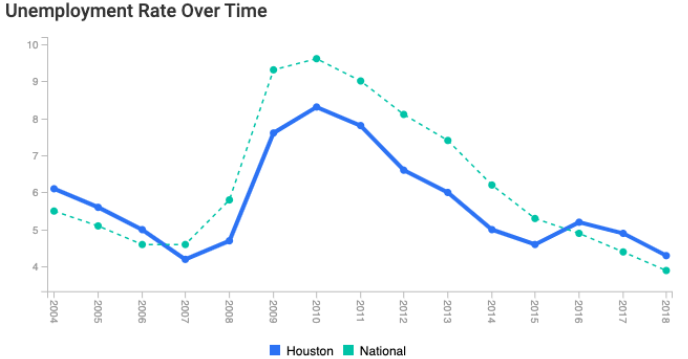Earlier this year, we described how a housing shortage in Houston, exacerbated by the devastation of 2017’s Hurricane Harvey, is driving up occupancy rates. We also spent a few words outlining why Space City might not be the most livable place: heat, humidity, flooding, crime and a stark divide between rich and poor.
Yet people — especially young professionals — keep moving there, despite all that plus the rising rents. We really owe it to Houston to tell that side of the story as well.
Follow the jobs
There’s a lot more to Houston than oil and gas, and the unemployment figures bear out that assertion. The energy sector is highly correlated to the economic cycle so, when the national economy enters a contraction, the oil patch tends to go bust. But that’s not what happened in Houston over the past dozen-or-so years.
 Credit: U.S. News & World Report. Source: U.S. Bureau of Labor Statistics
Credit: U.S. News & World Report. Source: U.S. Bureau of Labor Statistics
Even though today its unemployment rate is marginally higher than the national average, Houston was actually a good place to wait out the Great Recession. Historically speaking, that’s not the way things generally go in Texas. It should also be noted that having lower-than–national-average joblessness isn’t necessarily a good thing in 2019. The U.S. is at the point where unemployment is below the long-term “natural” rate, suggesting there’s currently a labor shortage.
Houston has hedged its bets in the job market. It is “home to more than two dozen Fortune 500 companies, including Sysco and FMC Technologies,” according to U.S. News & World Report. “The region was ranked the top manufacturing metro areas in the U.S. The Texas Medical Center, the world’s largest medical campus, is home to more than 50 health care, education, and research institutions. Houston is also an aerospace hub with NASA’s Johnson Space Center.”
And jobs in Houston can be high-paying. “The average annual income is higher than what residents of many other major metro areas make,” U.S. News continues. “Those with a specific skill set or advanced degrees, such as in health care, aerospace or oil, and gas, can earn as much as $200,000 a year.”
Town with no gown
According to City-Data.com, the average Houstonian is 33 years old, a year-and-a-half younger than the average Texan. You can’t assign a gender pronoun to that unspecified Houstonian because, like a flipped coin that landed on its rim, the split is exactly 50/50. Most Houston residents have not attained a college degree, and non-married people outnumber married people. A plurality of the city is Hispanic, with one-fifth of the population born in Latin America. Black and white residents each account for roughly a quarter of the city’s residents.
But how many are millennials who moved there from somewhere else? The answer is a little surprising. “The six cities which lost the most millennials are New York, San Diego, Miami, Houston, Las Vegas, and Chicago,” SmartAsset reported in 2017. So what’s a writer whose assignment is to discuss how Houston is attracting millennials to do?
Find a more recent — and more authoritative — source. “Seven metropolitan areas — Houston; Denver; Dallas; Seattle; Austin, Texas; Charlotte, N.C.; and Portland, Ore. — exhibited annual net migration gains for young adults that exceeded 7,000,” according to the Brookings Institution’s 2019 study. Houston, according to the study, more than doubles that number.
Isn’t it odd that so many surveys of millennials’ movements assume they all went to college? Sure, they’re more likely to have degrees than was the case with their parents’ generation but, according to CityLab, that just means that one out of three graduated instead of one out of four.
It’s exactly those non-collegian millennials that Houston attracts. According to Brookings, fewer than 40% of young adults completed college.
But it’s CityLab that puts the finest point on just how blue-collar Houston’s millennials are. “Miami and Houston have smaller shares of educated Millennials than Detroit and Allentown, Pennsylvania,” Richard Florida writes for the news outlet.
But how does one explain why one study of Houston demographics show a high net out-migration of millennials for Houston and, two years later, another shows a high net in-migration? Anyone who’s raised millennials can offer one possible explanation: They’re native Houstonians who moved back in with their parents.
Where they live
Of course, that’s just a theory. There are neighborhoods that are luring millennials from other cities and, to some extent, from the rooms where their Friday Night Lights cast posters still hang.
The Gridiron is Houston’s principal millennial magnet, according to the Houston Chronicle. “The area, best known for its proximity to the Astrodome, NRG Stadium, and Holocaust Museum in Houston, is estimated to be one of America’s zip code (77054) with the highest percentage of millennial residents,” according to reporter Francisco Ramirez, citing a RentCafe study.
Other real estate sites name Montrose, East Downtown (“EaDo”), Midtown, Fourth Ward and Museum Park as other sections that have attracted young Houstonians. Still, millennials are learning the lesson that the difference between what they want and what they get might involve a 40-minute Uber ride.
“In terms of sheer youngster population, the Addicks area (77084) in northwest Houston was found to have the largest millennial population in the city,” according to the Chronicle, which defines millennials as anyone born between 1977 and 1996. “Roughly 32,600 millennials reside in the area, although they make up a smaller share of residents in the area than Houstonians from other generations.”
In other words, maybe those Taylor Kitsch and Adrianne Palicki posters will be staying up for a while.
Houston at a glance
- Population: 2.3 million (2017), up 18.4% from 2000
- Unemployment rate: 4.3%, compared with a national average of 3.7%
- Average salary: $53,820, compared with a national average of $50,620
- Cost-of-living index: 93.5 (August 2019), compared with a national average of 100
Sources City-Data.com,: U.S. News & World Report, U.S. Bureau of Labor Statistics


